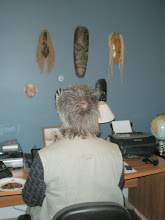Part Two: “We tried to carry this message to other alcoholics.”
God has entrusted a special gift of healing for sick alcoholics which He has withheld from all other persons. This was granted to us so that we might justify our right to live sober, normal lives by helping other alcoholics recover from their illness.
(What a famous A.A. principle this is! There are so many reminders in our literature that our recovery is a gift freely received, freely given, stories about people refusing to believe that the only reason a recovering alcoholic is talking to them - for free! - is to ensure that own person's sobriety. "It is important for him (or her) to realize that your attempt to pass this on plays a vital part in your own recovery." Big Book P. 94.)
We should be critical of our own development . . . as it is impossible to share with another something that we do not possess ourselves. Contrariwise, even though well qualified ourselves, we cannot share A.A. with alcoholics who reject our help. It is pointless to try. Herein lies a cardinal virtue of sponsorship - it is the momentary loss of self-centeredness. (So many important ideas here, too; chief among them being that if someone doesn't want our help they don't want our help. It's really hard to get sober if a person is really motivated - it's almost impossible if they are completely resistant. There's also the reminder that when we're trying to help someone else we lose some of that aberrant fascination with our own personal self. I mean . . . it's OK to be concerned with your own well-being but . . . c'mon . . . we're talking an unhealthy obsession. "But obviously you cannot transmit something you haven't got." Big Book P. 164.)
Another significant part of sponsorship, in which several members can carry the message, is that of starting new groups or working with weaker ones. All members must carry the message to develop A.A.'s growth and gain personal experience if we are to continue the source of referrals started by our founders. (Interesting that starting a new meeting can be an important part of carrying the message. Maybe I should stop bitching so much about the break-away meeting.)
Demands on the newcomer are few - it is imperative that the prospect: 1. Is an alcoholic. 2. Wants to quit drinking. 3. Calls A.A. for help. Successful sponsors require these qualifications of a newcomer. (Here we can see a little bit that our Fellowship has mellowed as it has become more of a well-known, mainstream organization. I laugh at the "require" part of the text. Frankly, anyone who comes in the door by whatever means and whether they're interested or not at all at getting sober is fine by us.)

No comments:
Post a Comment